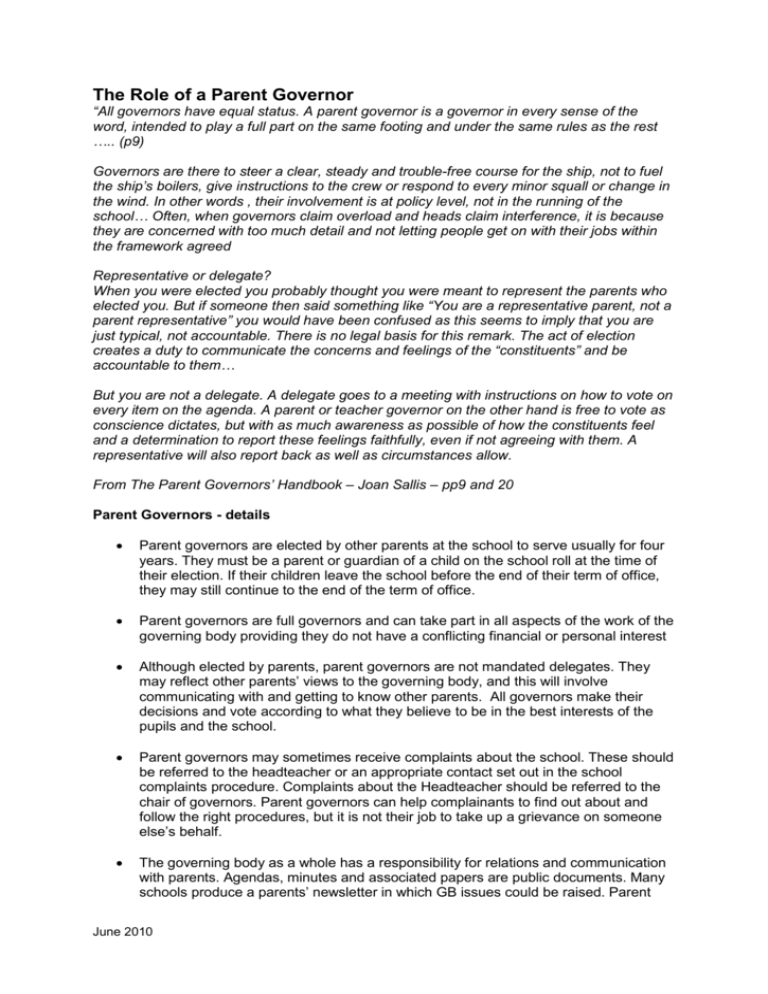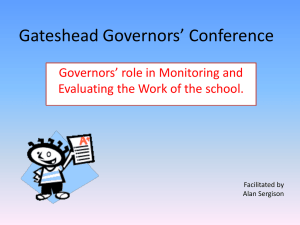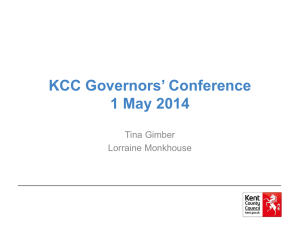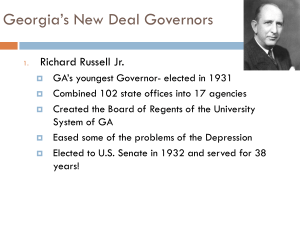The Role of a Parent Governor
advertisement

The Role of a Parent Governor “All governors have equal status. A parent governor is a governor in every sense of the word, intended to play a full part on the same footing and under the same rules as the rest ….. (p9) Governors are there to steer a clear, steady and trouble-free course for the ship, not to fuel the ship’s boilers, give instructions to the crew or respond to every minor squall or change in the wind. In other words , their involvement is at policy level, not in the running of the school… Often, when governors claim overload and heads claim interference, it is because they are concerned with too much detail and not letting people get on with their jobs within the framework agreed Representative or delegate? When you were elected you probably thought you were meant to represent the parents who elected you. But if someone then said something like “You are a representative parent, not a parent representative” you would have been confused as this seems to imply that you are just typical, not accountable. There is no legal basis for this remark. The act of election creates a duty to communicate the concerns and feelings of the “constituents” and be accountable to them… But you are not a delegate. A delegate goes to a meeting with instructions on how to vote on every item on the agenda. A parent or teacher governor on the other hand is free to vote as conscience dictates, but with as much awareness as possible of how the constituents feel and a determination to report these feelings faithfully, even if not agreeing with them. A representative will also report back as well as circumstances allow. From The Parent Governors’ Handbook – Joan Sallis – pp9 and 20 Parent Governors - details Parent governors are elected by other parents at the school to serve usually for four years. They must be a parent or guardian of a child on the school roll at the time of their election. If their children leave the school before the end of their term of office, they may still continue to the end of the term of office. Parent governors are full governors and can take part in all aspects of the work of the governing body providing they do not have a conflicting financial or personal interest Although elected by parents, parent governors are not mandated delegates. They may reflect other parents’ views to the governing body, and this will involve communicating with and getting to know other parents. All governors make their decisions and vote according to what they believe to be in the best interests of the pupils and the school. Parent governors may sometimes receive complaints about the school. These should be referred to the headteacher or an appropriate contact set out in the school complaints procedure. Complaints about the Headteacher should be referred to the chair of governors. Parent governors can help complainants to find out about and follow the right procedures, but it is not their job to take up a grievance on someone else’s behalf. The governing body as a whole has a responsibility for relations and communication with parents. Agendas, minutes and associated papers are public documents. Many schools produce a parents’ newsletter in which GB issues could be raised. Parent June 2010 governors and other governors could share decisions with parents (but not report in detail on who said what) unless the matter is confidential or it has been agreed that other channels are more appropriate for reporting. Declaring an Interest Parent governors should not participate in discussion if they have a personal interest in the outcome of any issue, or if their impartiality could be in doubt (and nor should any other governor). All governors are required to declare whether they have any financial interest, either direct or indirect in any matter, which may be considered at a meeting. If such an interest is declared, the governor may be required to withdraw from the discussion and have no part in any vote on the subject. Communicating with parents Ofsted will judge the effectiveness of the school’s engagement with parents and carers and will evaluate The extent to which the school takes account of parents’ and carers’ views and how well they are involved in contributing to decision making about whole school matters. The criteria for outstanding schools is The school has a highly positive relationship with all groups of parents and carers, particularly those groups of parents and carers who might traditionally find working with the school difficult. Parents and carers are heavily involved in decision-making on key matters through well-established procedures. Parents and carers are exceptionally well informed about all aspects of their own children’s achievement, well-being and development. The school provides tailored guidance and information about precise ways parents and carers can support their children’s learning across a wide range of subjects. All groups of parents and carers are able to communicate with the school through a wide range of media. Consistent and productive partnerships ensure that parents and carers are strongly engaged with their children’s learning and the school’s work. The school’s systems for keeping parents informed about aspects of its work ensure that parents and carers have coordinated, up-to-date, accurate and timely information. Some suggestions for communicating with parents: photographs and brief profiles of governors displayed in the school entrance / on the parents’ noticeboard and / or web-site governors attending parents’ meetings/ consultations wearing badges regular governor section in the school newsletter with information on decisions and forthcoming issues occasional meetings for parents with governors after school governor representation on school Parents’ Association Committee parent surveys (in conjunction with h/t) eg in some schools parent governors do face to face interviews with parents who may not otherwise fill in a form agendas and minutes of governor meetings on parent noticeboards and school website June 2010







